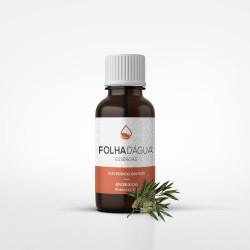- Out-of-Stock



100% natural tea tree essential oil - 10ml
Brand: folha d`água
The tea tree is a plant of Australian origin that was used by Aborigines to treat respiratory problems. Tea tree essential oil is used as a cutaneous antiseptic due to its bactericidal and fungicidal properties. It is used to treat acne and to heal insect bites and cuts. Its topical use can also be useful in the treatment of vaginal infections.
Main constituents: 4-terpineol (38.0%), γ-terpinene (20%), α-terpinene (9%).
The various uses of natural essential oils / BIO Folha d'Água:
Cosmetics elaboration:
Folha d'Água oils can be used to make cosmetics, soaps and perfumes. Just add a few drops of one or more essential oils in the saponification process to make a difference in the final fragrance of your soap. They are also used to make your own perfume, and the possibilities for combinations are endless.
Candle making or used in Diffusers:
Equally useful is the use of essential oils in the making of scented candles. The right time to dilute will be when the wax is melted and preferably before it is even placed in the mold to avoid waste evaporation due to the heat of the wax.
For diffusers just follow the manufacturer's instructions.
Therapeutic massages:
It is perfectly possible, and even widely used by professional masseurs, to dilute these essential oils with another vegetable-based oil for the practice of your massages. It is strictly inadvisable to use pure essential oils on the skin without being properly diluted with other neutral vegetable oils (base oils) or added when making massage candles (designed for this purpose). Potential allergies the user may have to some essential oils should also be considered.
Whenever there are no contraindications, the advantages of a massage made with the benefits of a specific vegetable and natural essential oil are enormous.
Food consumption:
We can ingest Folha d`Água biological essential oils, as long as they are diluted in other solutions (depends on the quantities of oils, taste and desired result), as a culinary condiment or food supplement. You should, however, consult your doctor or pharmacist to avoid contraindications and follow guidelines according to your clinical condition.
In addition to the guidelines of a health professional for your specific case, there is also a list of oils that are safe for your health and others that should never be part of this list, here are some examples:
safe essential oils for food consumption (following the doses recommended by your doctor, pharmacist or aromatherapist):
Basil - Bergamot - Black Pepper - Cinnamon Cassia - Coriander - Cinnamon - Sage Clariia - Clove - Copaíba - Frankincense - Geranium - Ginger - Grapefruit - Juniper - Lavender or Lavender - Lemongrass or Lemongrass - Lemon - Marjoram - Cajepute - Myrrh - Oasis or Oregano - Patchouli or Patchouli - Peppermint - Chamomile - Rosemary - Sandalwood or Hawaiian Sandalwood - Siberian Pine - Ylang Ylang - Grape seed - Wheat germ - Apricot kernel - Tea tree
essential oils NOT safe for food consumption:
Arborvitae or Thuja - Cedar - Cypress - Douglas Fir - Eucalyptus - Nard - Wintergreen - Citronella - Castor
You might also like